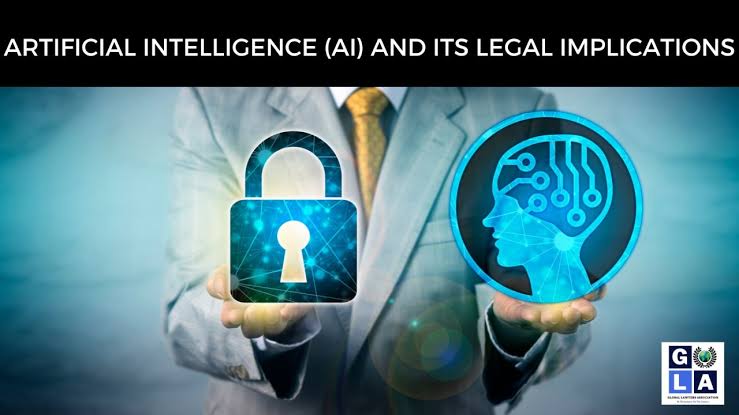Artificial Intelligence (AI) is revolutionizing various industries from healthcare to finance and transportation. As AI technologies advance rapidly, they raise significant legal and regulatory challenges that governments businesses and society must address. This comprehensive exploration delves into legal implications of AI. The evolving regulatory frameworks shape this intersection of technology and law with critical issues.
Artificial Intelligence refers to capability of machines to imitate human intelligence and perform tasks that typically require human intelligence. These include problem-solving, learning and decision-making. AI systems are powered by algorithms and data. This enables them to analyze vast amounts of information. They make predictions or recommendations based on this analysis.
Legal Implications of Artificial Intelligence
1. Liability and Accountability: One of the primary legal concerns surrounding AI is liability for damages caused by AI systems. Who is responsible when an AI makes a mistake or causes harm? Current laws often struggle to assign accountability, especially when AI operates autonomously.
2. Privacy and Data Protection: AI systems rely heavily on data, often personal and sensitive. Regulations such as the General Data Protection Regulation (GDPR) in Europe set strict guidelines on data collection, processing, and storage to protect individuals' privacy rights.
3. Bias and Discrimination: AI algorithms can perpetuate biases present in training data, leading to discriminatory outcomes in hiring, lending, and law enforcement. Addressing algorithmic bias requires transparency, fairness, and ongoing monitoring to mitigate unintended consequences.
4. Intellectual Property: AI's role in creating original works, such as artworks or literary texts, raises questions about copyright ownership. Should AI-generated content be protected under existing intellectual property laws, or does it require new regulations?
Regulatory Frameworks for AI
1. Global Perspectives: Countries worldwide are developing diverse regulatory approaches to AI. Some prioritize innovation with minimal regulation, while others emphasize ethical guidelines and stringent oversight to ensure AI's responsible development.
2. Ethical Considerations: Ethical frameworks for AI focus on principles such as transparency, accountability, fairness, and safety. Initiatives like the European Commission's Ethics Guidelines for Trustworthy AI aim to guide AI development in alignment with societal values.
3. Industry-specific Regulations: Certain industries, like healthcare and autonomous vehicles, require specialized regulations tailored to AI applications' unique risks and impacts. These regulations often involve safety standards, data governance, and ethical guidelines specific to the industry's needs.
Key Issues in AI Regulation
1. Transparency and Explainability: AI systems must be transparent in their operations and decisions, enabling users to understand how algorithms reach conclusions. Explainable AI (XAI) techniques aim to provide insights into AI's decision-making processes to enhance accountability and trust.
2. Algorithmic Accountability: Holding AI systems accountable for their actions involves monitoring their performance, auditing algorithms for biases, and ensuring compliance with legal and ethical standards. Regulatory frameworks may mandate regular audits and transparency reports from AI developers and users.
3. Human Oversight and Control: Balancing automation with human oversight is crucial to mitigate AI risks and ensure human accountability. Regulations may require safeguards to prevent AI from making critical decisions independently without human intervention.
4. International Cooperation: AI's global nature necessitates international collaboration on regulatory standards, data sharing protocols, and ethical guidelines. Forums like the OECD's AI Policy Observatory facilitate dialogue and cooperation among countries to address common challenges and harmonize regulations.
Challenges in Implementing AI Regulations
1. Pace of Technological Innovation: AI evolves rapidly, outpacing the development of regulatory frameworks. Policymakers face the challenge of creating flexible regulations that accommodate technological advancements while protecting public interests.
2. Interdisciplinary Expertise: Effective AI regulation requires collaboration across disciplines, including law, computer science, ethics, and economics. Policymakers need diverse expertise to anticipate AI's impacts and develop informed regulations.
3. Public Engagement and Awareness: Educating the public about AI's benefits, risks, and regulatory efforts is crucial for fostering informed discussions and gaining societal acceptance of AI regulations. Transparency and public consultation enhance trust and legitimacy in regulatory processes.
Conclusion
Artificial Intelligence holds immense potential to drive innovation, improve efficiency, and transform industries globally. However, its rapid advancement necessitates careful consideration of legal and regulatory frameworks to address emerging challenges and mitigate risks effectively. By fostering international cooperation, promoting ethical guidelines, and ensuring transparency and accountability in AI development and deployment, stakeholders can harness AI's benefits while safeguarding individuals' rights and societal values. As AI continues to shape the future, robust and adaptive regulatory frameworks will play a pivotal role in navigating its legal implications and promoting responsible AI innovation for the benefit of all.
